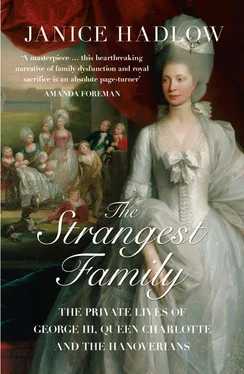The king’s response was both more straightforward and more hostile. He had no sympathy with his son’s demands. Frederick had already run up huge debts in Hanover which he had no prospect of repaying without his father’s help. George also argued that the larger allowance he had received as Prince of Wales had been required to support a growing family, whilst his son was responsible for no one but himself. Frederick’s persistence in pursuing a comparable sum confirmed all his father’s early apprehensions about the ambition and opportunism of his heir; he suspected the cash was intended to further Frederick’s political ends, financing an opposition that would inevitably be directed against him. Soon the king refused to speak to his son at all. ‘He hated to talk of him almost as much as to talk to him,’ observed Hervey; but he made his feelings known by ‘laying it on him pretty thick’ in more oblique references. ‘One very often sees a father a very brave man, and the son a scoundrel,’ the king once declared to a group of embarrassed listeners, ‘a father very honest and his son a great knave; the father a man of truth and the son a great liar; in short, a father that has all sorts of good qualities and a son that is good for nothing.’ Hervey noticed that the king stopped short, ‘feeling that he had pushed it too far’, and noted that in some cases ‘it was just the reverse, and that very disagreeable fathers sometimes had very agreeable men for their sons. I suppose,’ remarked Hervey, ‘that in this case he thought of his own father.’ 54
George’s behaviour helped to usher in precisely the situation he had feared: soon, the prince stood at the centre of an organised coalition of ambitious politicians keen to use his grievances as a means of attacking his father’s administration. Far from being a token figurehead, the prince was an active participant in the development of an opposition strategy, doing all he could to attract supporters to his cause. He was successful in luring some of the brightest talents of the rising generation into his orbit; recognising that time was on his side, he did all he could to win over the young. His friend and adviser Lord Egmont said he had even tried to attract into his camp the headmaster of Westminster School, as it was considered such a breeding ground for the politicians of the future.
Slowly, the prince began to feel his potential strength. When Robert Walpole’s government found itself unable to carry the controversial Excise Bill through Parliament in 1737, Frederick declined to come to his father’s assistance by ordering his supporters to vote with the ministers. It was his first public clash with the king. Walpole, alarmed at the precedent it set for the future, tried to coax him towards more dutiful behaviour by offering to raise the vexed issue of his allowance with Parliament. But Frederick was not interested; he was not to be bought off with promises, and was prepared to wait for a better opportunity to emerge.
The king did not react well to his son’s defiance. For some time he had not spoken to Frederick. Now, when forced into his company, he could not be brought to make the smallest acknowledgement of his presence. ‘Whenever the prince was in a room with the king,’ observed Hervey, ‘it put one in mind of stories one has heard of ghosts that appear to part of the company and are invisible to the rest; and in this manner, wherever the prince stood, though the king passed ever so near, it always seemed as if the king thought the place the prince filled a void space.’ 55George later told Hervey that he had once asked Caroline whether she thought ‘the beast was his son’. He did not mean to impugn her fidelity; drawing perhaps on the same vision of the world that fuelled his belief in vampires, he explained that he thought Frederick might be what the Germans called ‘a Wechselbalg ’ – a changeling. 56
George’s exasperation was increased by the apparent indifference with which his son appeared to receive the snubs and insults meted out to him. While his father fumed at St James’s, Frederick turned with annoyingly blithe unconcern to his own pleasures. He was a skilled cricketer, captaining the Surrey team and – to Hervey’s fastidious disgust – regularly playing alongside gardeners and grooms. He shared with most of his family a passionate love of music, although, unlike his father, he liked to perform as well as listen. He was an accomplished cellist and in 1734 gave impromptu concerts once or twice a week at Kensington Palace for anyone who turned up to enjoy them – including, noted a horrified Hervey (who compared Frederick to Nero playing his fiddle), ‘all the underling servants and rabble of the palace’. 57Like his mother, he loved books and read widely in subjects ranging from politics to philosophy to theology. Like her too, he relished an argument and was a sharp and nimble debater. Frederick even dabbled in writing himself. When he and Hervey were still friends, they had produced an undistinguished drama, The Modish Couple , which lasted only a few nights when performed on stage, and had closed amidst protests from a furious audience demanding their money back.
In 1734, the prince approached the king and asked permission to marry. George refused at first, citing Frederick’s ‘childish and silly’ behaviour as his justification; he vetoed a plan for the prince to reopen negotiations for the Princess of Prussia, famously remarking that he did not think grafting a coxcomb on to a halfwit would improve the breed. But on returning from one of his regular trips to Hanover in 1736, George announced that during his visit, he had seen the Princess Augusta of Saxe-Gotha, and thought she would make a suitable wife for his son. The prince answered ‘with great duty, decency and propriety, that whatever his majesty thought a proper match for his son would be acceptable to him’. In the midst of his affair with Mme de Wallmoden, the king was keen to return to Hanover as soon as possible, and demanded that the match take place immediately.
A few months later, Augusta arrived in London. She was seventeen years old, gawky, naive and alone: she ‘suffered to bring nobody but a single man with her’. Hervey observed she was ‘rather tall and had health and youth enough in her face, joined to a very modest and good-natured look, to make her countenance not disagreeable’; but his practised seducer’s eye found ‘her arms long, and her motions awkward, and in spite of all her finery of jewels and brocade’ she had ‘an ordinary air which trappings could not cover or exalt’. 58She spoke not a word of English; her mother explained that it had not been thought necessary to teach her, believing that ‘the Hanover family having been above twenty years on the throne, to be sure most people in England must now speak German’. 59
Nervous and inexperienced as she was, Augusta made a good beginning by prostrating herself on the floor in front of the king, who found this extreme form of respect entirely to his liking. She summoned enough courage to support herself through the rigours of the marriage ceremony, and she endured the jocular formality of a public wedding night with a man she had never met before with phlegmatic resignation. The young couple were led to their chamber and undressed with great ceremony. Once they were established in bed, the court processed past them, offering congratulations and ribald remarks about what was to come next. The prince was observed to eat glass after glass of jelly, which was thought to be an aphrodisiac; ‘every time he took one’, Hervey noted disdainfully, ‘turning about and laughing and winking at some of his servants’. He also wore a nightcap ‘some inches higher than any grenadiers cap in the whole army’. The next morning, the queen gossiped away to Hervey ‘with her usual enjoyment, on the glasses of jelly and the nightcap’, saying that one had made her sick and the other had made her laugh. They both thought Augusta looked so refreshed that ‘they concluded she had slept very sound’. 60
Читать дальше












